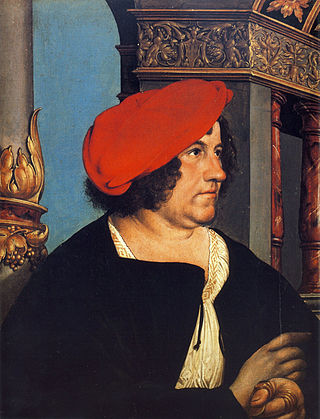
Matthäus Merian der Ältere was a Swiss-born engraver who worked in Frankfurt for most of his career, where he also ran a publishing house. He was a member of the patrician Basel Merian family.
Karl Rudolf Hagenbach was a Swiss church theologian and historian. He was particularly interested in the Protestant Reformation and its figures.
Julius Leopold Theodor Friedrich Zincken or Zinken also Sommer was a German entomologist. He also appears in literature cited as Zinken-Sommers and Zinken gennant Sommers.

Meyer Kayserling was a German rabbi and historian.
Friedrich Kambartel was a German philosopher.

The Darmstadt Madonna is an oil painting by Hans Holbein the Younger. Completed in 1526 in Basel, the work shows the Bürgermeister of Basel Jakob Meyer zum Hasen, his first wife, his current wife, and his daughter grouped around the Madonna and infant Jesus.

Jakob Meyer zum Hasen was the bürgermeister of the city of Basel from 1516 to 1521. A money changer by profession, he was the first bürgermeister of Basel to be a tradesman, belonging to a guild rather than a member of the aristocracy or a wealthy family. He is known as a patron of the painter Hans Holbein the Younger, having commissioned the Darmstadt Madonna and a double portrait from him.
Fritz Gause was a German historian, archivist, and curator described as the last great historian of his native city, Königsberg, East Prussia. Gause's most important work was his three-volume history of Königsberg, Die Geschichte der Stadt Königsberg in Preußen. He was connected to nationalist historic movement called Ostforschung

Richard Armstedt was a German philologist, educator, and historian.

Pregolsky is a residential area within Tsentralny City District of Kaliningrad, Kaliningrad Oblast, Russia.

Meyer zum Pfeil was a prosperous Swiss patrician and noble family from Basel. It appears in Basel in the 15th century and is one of Basel's oldest patrician families, and dominated the city for several centuries together with a handful of other patrician families. The family were prominent merchants, especially cloth merchants, and many family members have served as council members and Mayors of Basel. The family name is derived from the arrow in its coat of arms. Family members used the noble honorific Junker already at the time the family appeared in Basel.

Abel Socin was a Swiss merchant, politician, law lord (Gerichtsherr) and diplomat from Basel. He was a member of the Grand Council of Basel and served as the envoy of the Swiss Confederation to the French court from 1679.

Melusine is a 1971 German-language opera by Aribert Reimann, on a libretto by Claus H. Henneberg after Melusine, a 1920 play in four acts by Yvan Goll which transposes the legendary water-spirit to Goll's time. The opera was written for the Schwetzingen Festival, where it premiered in 1971. It was recorded in 2010.

The Double Portrait of Jakob Meyer zum Hasen and Dorothea Kannengießer is a 1516 oil on limewood panel painting by Hans Holbein the Younger. The two panels were commissioned by Jakob Meyer zum Hasen, mayor of Basel, and show him and his second wife Dorothea Kannengießer. The occasion for the portrait could be Meyer zum Hasen's election as the mayor the same year. Holbein was eighteen years old at the time and had arrived in Basel together with his brother Ambrosius only in 1515. He signed with the letters HH. He only received the right to sign with his full name in 1519, when he was accepted as a member of the painters' guild of Basel. They are the earliest surviving portraits by the artist and are linked to drawings he may have made in his hometown of Augsburg. The painting came into possession of the Faesch Museum founded by Remigius Faesch who was married with Rosa Irmi, a granddaughter of Jakob Meyer zum Hasen. It was exhibited in the Museum Faesch until 1823, today both panels are exhibited in the Kunstmuseum Basel.
Rudolf Sellner, born Gustav Rudolf Sellner was a German actor, dramaturge, stage director, and intendant. He represented in the 1950s a radical Instrumentales Theater. After decades of acting and directing plays, he turned to staging operas, and was a long-time intendant of the Deutsche Oper Berlin from 1961, when the Berlin Wall was built. He staged notable world premieres, including Ernst Barlach's play Der Graf von Ratzeburg in 1951, Ionesco's Mörder ohne Bezahlung in 1958, Giselher Klebe's Alkmene in 1961 for the opening of the Deutsche Oper, and Aribert Reimann's opera Melusine in 1971.

Von der Mühll or Von der Mühl is a Swiss patrician and noble family.
Ernst Kähler (1914–1991) was a German Protestant theologian and Church historian. He was the grandson of theologian Martin Kähler (1835–1912).
Hans Joachim Marx is a German music historian. He has been professor of European music history at the University of Hamburg.

Harry Goldschmidt was a Swiss musicologist.
Wilfried Rosendahl is a German bioarchaeologist, geoscientist, and cultural manager, general director of the Reiss-Engelhorn-Museums in Mannheim, and honorary professor at the Institute of History at the University of Mannheim.












